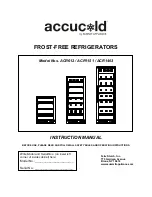
SERVICE MANUAL
Model:
HRF-265F
2
4
Issue
20090827
Rev.
Ref0908S006V0
It is quite difficult to differentiate this trouble from others because they often have similar symptoms.
In repairing, firstly, hear attentively if there is some abnormal sound coming from the compressor
(sometimes , the broken pieces of valve block may strike against the cylinder), and feel the
compressor casing with your hand to ascertain whether it is too hot, this is also helpful to the
troubleshooting; secondly, measure the pressures at the high and low pressure ports of the
compressor with pressure gauges, if the gas suction valve block is broken, the suction pressure
gauge pointer will swing violently and the suction pressure is very high, whereas when the gas
discharge valve block is broken , the discharge pressure gauge pointer will swing drastically and the
discharge pressure is very high. In the both cases, stop the compressor at once, and if technique is
available, open the cylinder cover and check up the valve block, repair it, or replace it with a new one.
7-3-3
Suddenly stop
The cause of sudden stop of a compressor during its running is mostly that the gas suction pressure
and/or discharge pressure exceed their respective prescribed ranges, thus making a
pressure-operated protective relay shut off the power to the compressor and stop it. In the following
we discuss mainly the reasons for causing excessively high gas discharge pressure and low suction
pressure.
1) Stoppage due to excessively high gas discharge pressure
a) Too much refrigerant charged into the system
Analysis of Trouble
The phenomenon, such as loose frosting and poor refrigerating effect, may occur if excessive
refrigerant has been charged into the system. Superfluous refrigerant will occupy a certain space of
the evaporator, thus reduce its heat dissipating area, and the phenomenon of “liquid striking” may
occur, too. Meanwhile, dew or frost condensation may occur on the gas return tube, and the gas
discharge pressure will obviously rise, when it reaches the threshold value, the protective relay will
actuate and shut off the power supply to the compressor.
Remedy
Open the tubing, re-evacuate and then charge the system with a proper quantity of refrigerant.
b) Air left in the system
Analysis of Trouble
The residual air in the system will circulate together with the refrigerant in the system. The major
symptoms caused by this residual air is higher gas discharge pressure, higher discharged gas
temperature (the gas discharge tubing is considerably hot when you feel it with your hand), and
poorer refrigerating effect. Furthermore, the gas discharge pressure will exceed its normal value
when the compressor has run for a period not too long, thus making the protective relay actuate and
bring to a stoppage.
Remedy
Check up how the air has been left in the refrigerating system. Generally, there are two possibilities:







































